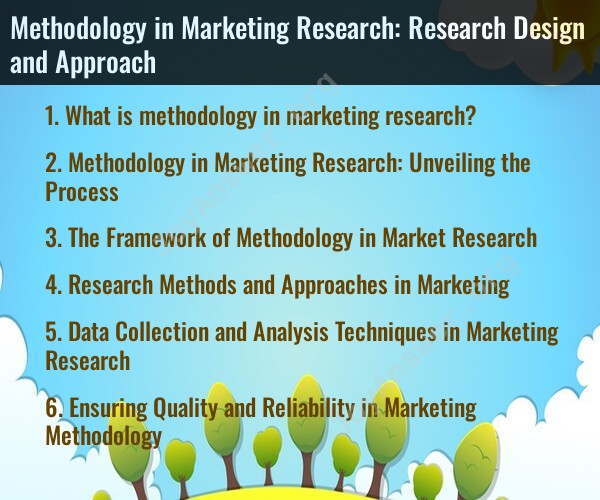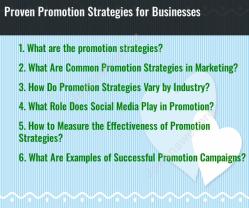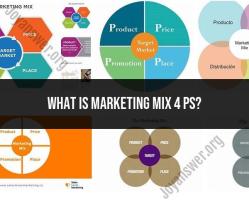What is methodology in marketing research?
Methodology in marketing research refers to the systematic approach and techniques used to collect, analyze, and interpret data to address specific marketing-related questions or problems. It is a crucial component of any marketing research project, as it defines the overall research design and strategy for conducting the study. A well-defined methodology ensures that the research is carried out effectively, the data collected is reliable, and the results are valid. Here are the key elements of methodology in marketing research:
Research Design: This is the framework or blueprint that outlines the structure of the research project. It includes decisions about the research objectives, data sources, data collection methods, and data analysis techniques. Common research designs in marketing research include exploratory, descriptive, and causal research designs.
Data Collection Methods: Methodology defines the techniques for gathering data. Common data collection methods in marketing research include surveys, interviews, focus groups, observations, content analysis, and experiments. The choice of method depends on the research objectives and the nature of the data needed.
Sampling Strategy: If the research involves a large population, a sample is often selected. The methodology outlines how the sample is chosen and how it represents the target population. Sampling techniques can be random, stratified, convenience, or purposive, among others.
Data Analysis Techniques: The methodology specifies the statistical and analytical methods that will be used to process and interpret the collected data. This includes techniques like regression analysis, correlation, hypothesis testing, and content analysis, depending on the nature of the data and research questions.
Questionnaire or Data Collection Instrument: If surveys are used, the methodology should detail the development of the questionnaire, including the wording of questions, response options, and the order of questions.
Data Validation and Quality Control: Procedures for ensuring data quality and reliability are outlined in the methodology. This may involve pre-testing questionnaires, data cleaning, and addressing potential sources of bias.
Ethical Considerations: Methodology should address ethical concerns, such as obtaining informed consent from participants, maintaining privacy and confidentiality, and ensuring the research is conducted ethically and with respect to participants' rights.
Timeline and Budget: The methodology often includes a timeline that outlines the schedule for different phases of the research project, from data collection to analysis and reporting. It should also consider the budget required for the research.
Data Presentation and Reporting: The methodology can specify how the research findings will be presented and reported, including the format of reports, charts, graphs, and the structure of the final research document.
Iterative Process: Methodology recognizes that marketing research is often an iterative process. If initial findings lead to new questions, the methodology should allow for adjustments and further research.
In marketing research, the methodology is critical in ensuring that the research process is well-planned, data is collected accurately, and insights are drawn from the data effectively. The methodology serves as a roadmap for the entire research project and helps ensure that the research objectives are met.
Methodology in Marketing Research: Unveiling the Process
Marketing research methodology is the systematic process of collecting, analyzing, and interpreting data to help businesses make informed marketing decisions. It is a critical component of any successful marketing strategy, as it provides insights into the needs, wants, and behaviors of target consumers.
The marketing research process typically includes the following steps:
- Define the research problem or objective. What do you need to know to make a better marketing decision?
- Develop a research design. This includes identifying the research methods, data collection techniques, and sampling procedures that will be used.
- Collect the data. This can be done through primary research (e.g., surveys, interviews, focus groups) or secondary research (e.g., industry reports, government data).
- Analyze the data. This involves using statistical methods and other tools to identify patterns and trends in the data.
- Interpret the findings and draw conclusions. What do the results of the research mean for your marketing strategy?
- Communicate the findings to stakeholders. This can be done through a written report, presentation, or other means.
The Framework of Methodology in Market Research
The framework of marketing research methodology is based on the following principles:
- Objectivity: The research should be conducted in an objective and unbiased manner.
- Systematization: The research should be conducted in a systematic way, following a clear and logical process.
- Accuracy: The data collected should be accurate and reliable.
- Relevance: The research findings should be relevant to the research problem or objective.
- Usefulness: The research findings should be useful for making marketing decisions.
Research Methods and Approaches in Marketing
There are a variety of research methods and approaches that can be used in marketing research. The most appropriate method to use will depend on the specific research problem or objective.
Some common research methods include:
- Surveys: Surveys are a quantitative research method that involves collecting data from a sample of respondents using a questionnaire.
- Interviews: Interviews are a qualitative research method that involves collecting in-depth data from a small number of respondents.
- Focus groups: Focus groups are a qualitative research method that involves collecting data from a small group of respondents who are led in a discussion about a particular topic.
- Observation: Observation is a research method that involves collecting data by watching and recording the behavior of people or things.
- Secondary data analysis: Secondary data analysis is a research method that involves analyzing data that has already been collected for other purposes.
Data Collection and Analysis Techniques in Marketing Research
There are a variety of data collection and analysis techniques that can be used in marketing research. The most appropriate technique to use will depend on the specific research method being used.
Some common data collection techniques include:
- Online surveys: Online surveys are a convenient and efficient way to collect data from a large sample of respondents.
- Phone surveys: Phone surveys can be used to collect data from respondents who may not have access to the internet or who are not comfortable completing online surveys.
- In-person surveys: In-person surveys can be used to collect data from respondents who are difficult to reach through other methods.
- Focus groups: Focus groups can be used to collect in-depth data from a small group of respondents.
- Observation: Observation can be used to collect data on the behavior of people or things in a natural setting.
Some common data analysis techniques include:
- Descriptive statistics: Descriptive statistics are used to summarize and describe data.
- Inferential statistics: Inferential statistics are used to draw conclusions about a population based on data collected from a sample.
- Qualitative data analysis: Qualitative data analysis is used to analyze non-numerical data, such as text, images, and audio recordings.
Ensuring Quality and Reliability in Marketing Methodology
To ensure the quality and reliability of marketing research, it is important to:
- Use a sound research design. The research design should be tailored to the specific research problem or objective.
- Collect data from a representative sample. The sample should be representative of the target population.
- Use accurate and reliable data collection methods. The data collection methods should be designed to minimize errors and biases.
- Analyze the data carefully. The data should be analyzed using appropriate statistical methods.
- Interpret the findings carefully. The findings of the research should be interpreted in light of the limitations of the study.
By following these principles, businesses can ensure that their marketing research is conducted in a












